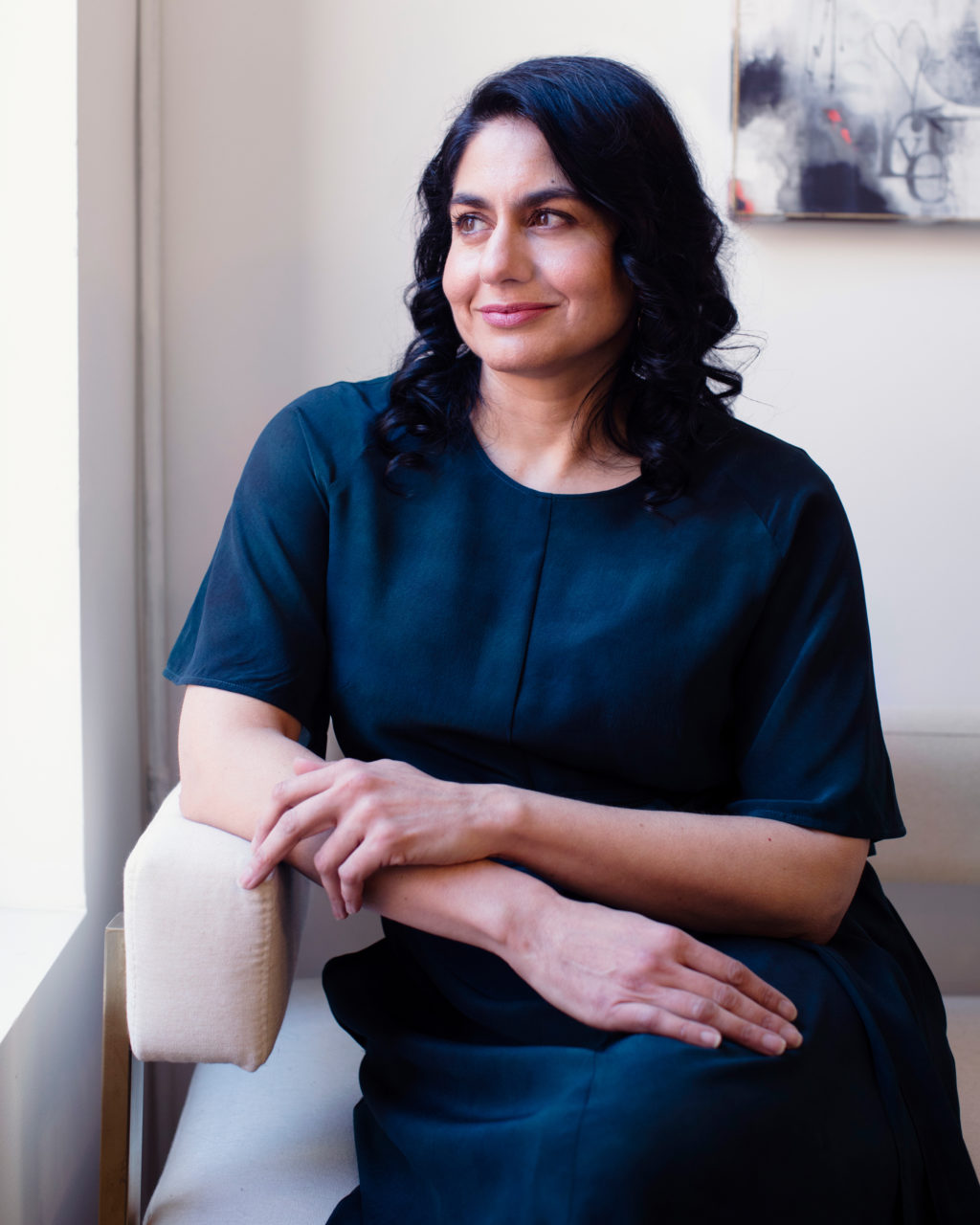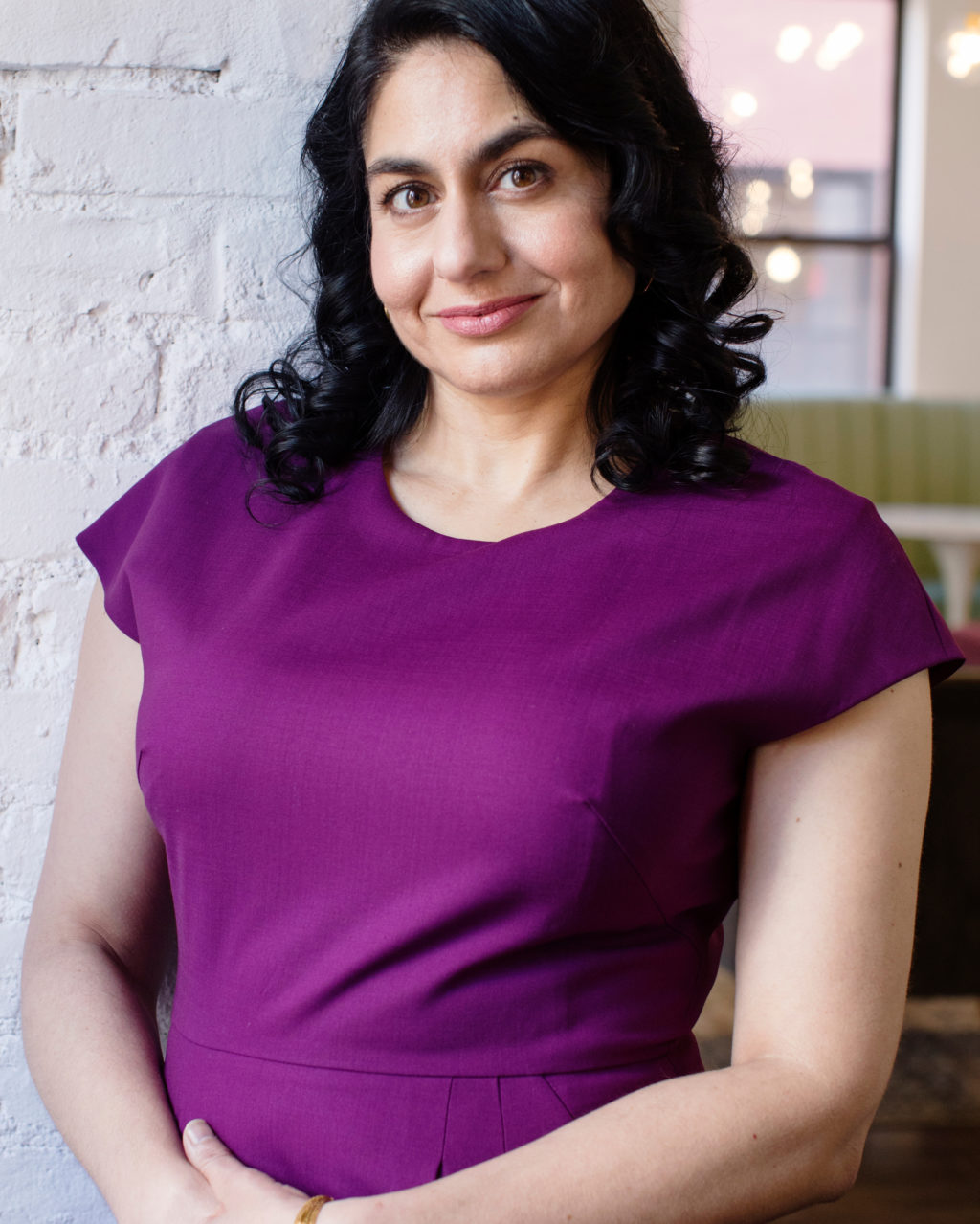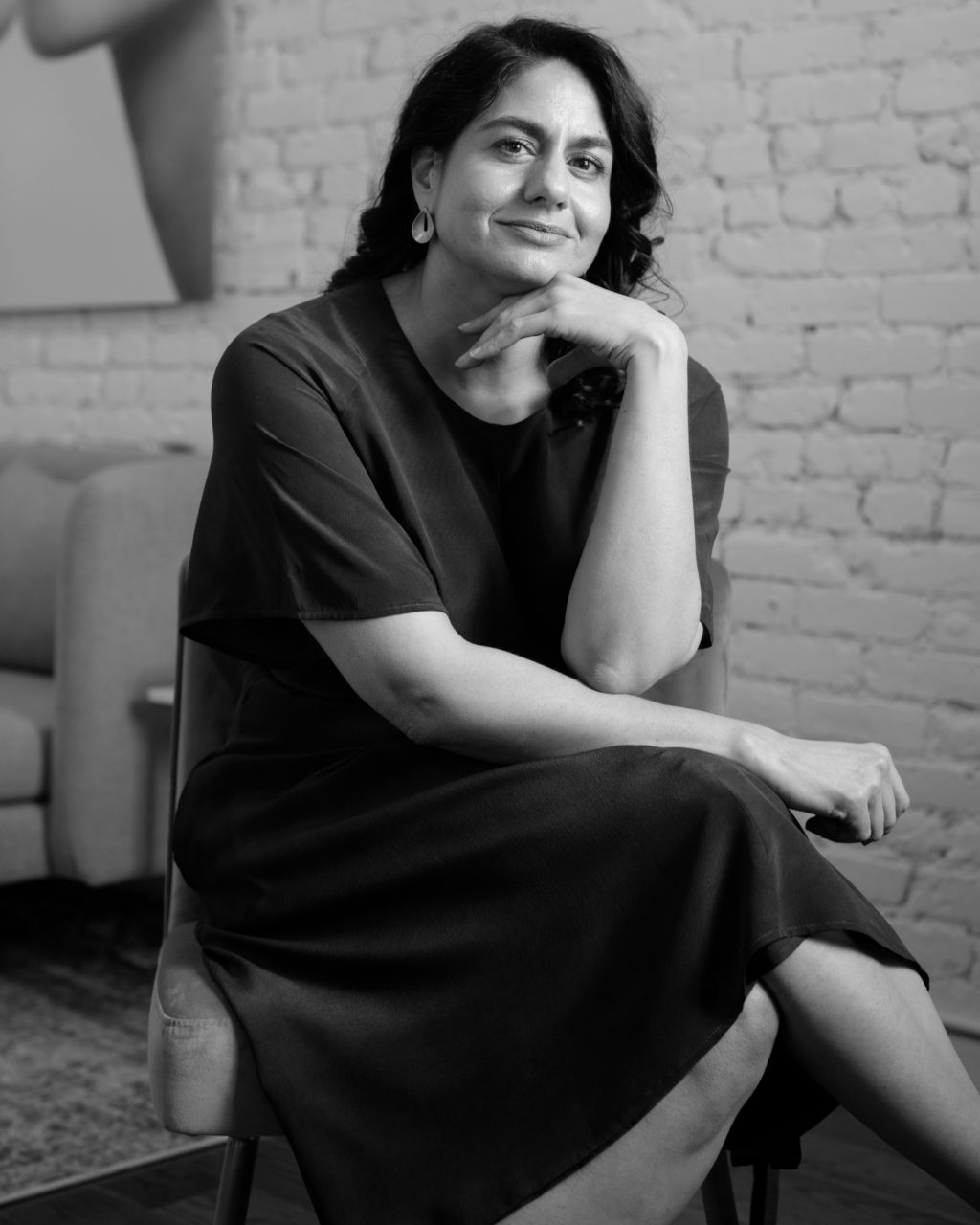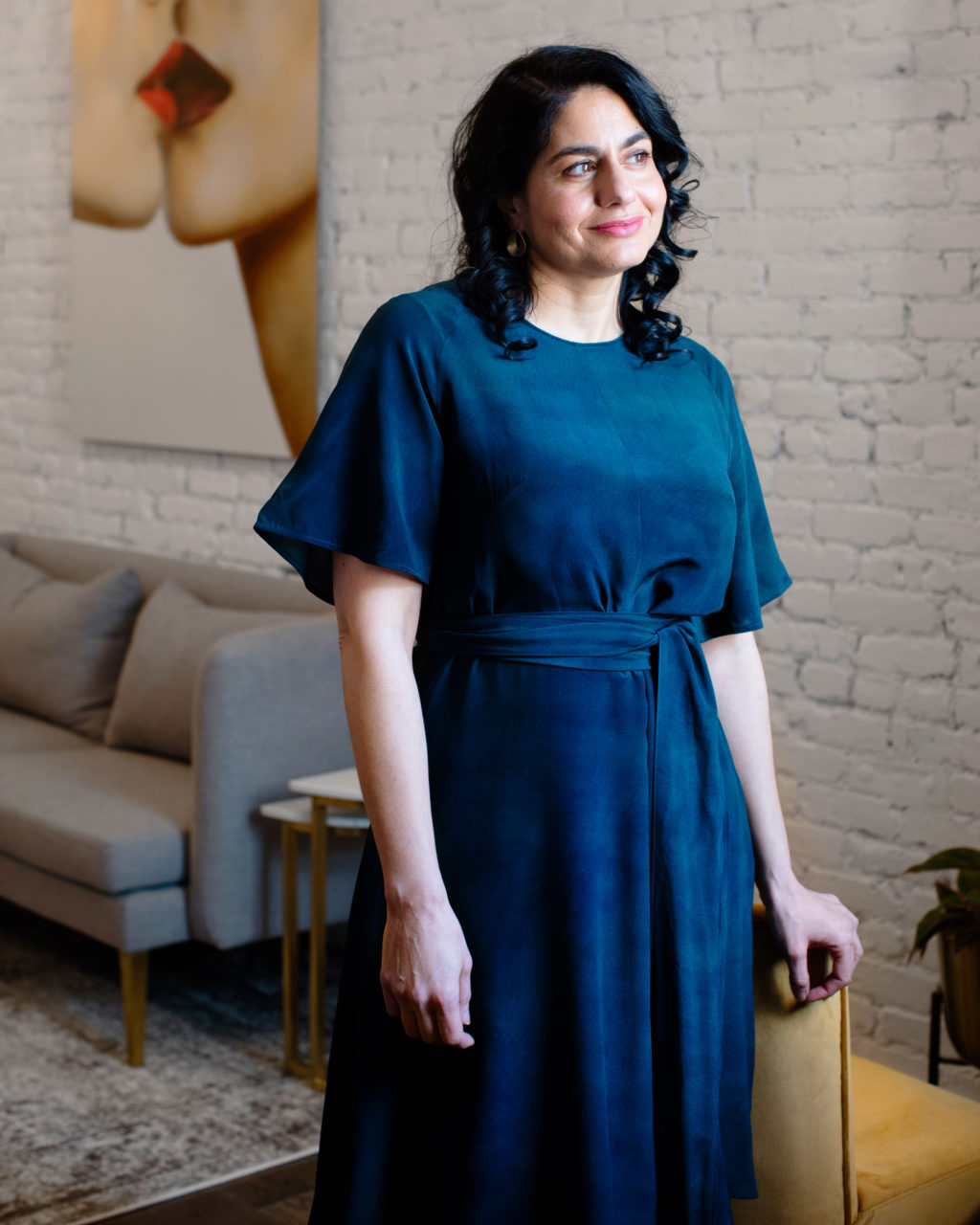Walking The Tightrope Between Workaholism and Mental Heath
April 05, 2019 | Filed in: Woman of the Week
Manisha Thakor had a hugely successful career in finance—when she wasn’t unraveling in private. Then, at the age of 47, she discovered that she’d been living with bipolar II disorder for her entire life, cycling between hypomania and periods of extreme depression. Today, she’s the vice president of financial well-being at Brighton Jones, a wealth management firm, where she applies her business know-how to redefining “success.” Her new podcast, “True Wellth,” debuted on March 27.
I GREW UP IN COLUMBUS, INDIANA. I think the population was 30,000 people when I lived there, and with all due respect, it was not terribly pleasant. My dad is from India and my mom is American, with blond hair and blue eyes. Mixed marriages weren’t really a thing back then, so I was the odd girl out, with a funny name and a funny heritage. Also, many Indian women have hair in places like their upper lip or chin, so most Indian moms will take their daughters to get threaded. But my mom didn’t know what to do with her hairy half-Indian kid. So there I was, heading off to school with my hairy upper lip, dorky coke-bottle glasses, and braces. I was chubby and smart. It was like I grew up in the movie Mean Girls.

Manisha wears the Jessica dress.
THEY DIDN’T CALL IT BULLYING BACK THEN. They just called it kids being kids. But when I look back that’s what it was. I was bullied by the cool kids, the cheerleaders, and the football players. I found solace in books and academics, which transformed my life. Most people I grew up with are still there. I’m grateful for the impetus that they gave me to dream bigger. And I think [those experiences] made me an exceptionally empathetic person.
MY PARENTS WERE DEFINITELY AHEAD OF THEIR TIME. They met in Rochester, New York, when my dad was working for Xerox. He had just come over from India and got his master’s degree in engineering and an MBA. My mom received her master’s in biology at the University of Rochester. Then my dad got a great job at a Fortune 500 company headquartered at the time in Columbus, Indiana. He climbed the ranks, became the chief financial officer of that company, and then retired in his early 50s. My mom wanted to go back to school and get a Ph.D., so my parents moved to Chapel Hill, North Carolina, and they’ve been there ever since. My mom only recently retired from her academic career, in her 70s. They both got to do what they wanted to do and both got to spend time with their kids.
I ATTENDED WELLESLEY COLLEGE, which I found out about while babysitting for a woman who I thought was the chicest person on the planet because she had a Talbot’s catalog on her coffee table. She had gone to Wellesley, and she encouraged my parents to take me to visit. It was love at first sight. I applied early, and I had the most amazing time. A few years later, I went to Harvard Business School for my MBA.

Manisha wears the Masha dress.
AFTER BUSINESS SCHOOL, I moved to Houston, where I had no family or connections, to work for a gentleman named Fayez Sarofim who had created his own firm. I worked there as a portfolio manager for over a decade, from age 27 to 37, and it was a dream job. The thing I loved the most about working for Fayez was that he never judged me by my gender or age. He always focused on my abilities and results. It was early in my career in a very male-dominated field, and I was judged on my merits. That was transformative.
I WAS A NON-STOP WORKAHOLIC. I was on a plane probably 45 weeks out of the year. I’d land at Houston Intercontinental Airport at 9 p.m., drive to the office, work until 1 or 2 a.m., go home, sleep, shower, and be back in the office at 8 a.m. I accomplished a lot. I built out a separate business unit, and I grew it from nothing to almost six billion dollars. I would go to a city and do seven pitches in a day, and each one would be 45 minutes. At the end of the day, my cheeks were spasming from having talked so much.
IN RETROSPECT, I WAS HIGH ON IT. I loved the work, and more than anything I loved Fayez. He was like a grandfather to me. He was an investment legend and I wanted to soak up as much of it as I could. One of the biggest compliments he ever gave me was when he said, “You’re just like me, you’re scrappy.” He recognized that drive.

Manisha wears the Tory dress.
WHILE I DIDN’T KNOW IT AT THE TIME, I ALSO HAD BIPOLAR II DISORDER, though I was not diagnosed with it until about two years ago. I had been misdiagnosed for so many years because when you are bipolar you go into periods of hypomania. Most people do crazy things —they gamble, shop excessively, have sex indiscriminately. I became a workaholic. In finance, that’s called being a good employee. So that behavior didn’t seem odd to me at all. Then I’d fall into these patches of depression. I always envisioned myself zooming into a wall. I’d do six 80-hour work weeks, going as fast as I could, and then I’d crash, and then I’d pick myself up, and I’d repeat it.
NOW I SPEAK VERY OPENLY ABOUT MY MENTAL HEALTH because I want to help as many people as I possibly can with this. The first time I sought help was at Wellesley. I limped into the infirmary, where I was given a diagnosis of exhaustion. Then I went to Harvard and had a severe downturn there, which is when I saw an actual psychiatrist. She told me I was depressed and prescribed me Prozac when it was a new drug. After that, I became a workaholic. Every year, I would see my general practitioner and say, “Yep, I still need my Prozac, I’m still depressed.”

Manisha wears the Jessica dress and the Fraser earrings.
I WOULD ONLY COLLAPSE IN PRIVATE. I would call it “flipping the switch,” and I became a master of it. Not once did I get in front of a client, or on a stage, or in front of a TV camera and have anybody know that I’d just been huddled in a ball sobbing in the bathroom. It was hard. I always thought, “Well, this is the flip side of success. You work 80 hours a week, you give everything, then you collapse because you’re exhausted.” The external metrics of success were lining up: I was making more money than I ever imagined, and I was generating results for my clients.
IN MY 30s, I MARRIED A MAN who’s 20 years older than me and he wanted to move to Santa Fe. This was before it was feasible to work remotely, so I left the institutional world and went through what I call my Suze Orman period, writing books and doing a lot of media and talks. I also started managing money for people—specifically bread-winning women—as a certified financial planner.
THEN MY MARRIAGE CRATERED. I now have a loving, platonic relationship with my ex-husband. But when we got divorced, Santa Fe was too small for the two of us and his new lady friend. So I got out of Dodge and I did an eat, pray, love. I rented places on Airbnb and VRBO in different cities to decide where I wanted to live next, from Boulder to Barcelona, and I fell in love with Portland, Oregon. I moved here with my car and my books and my clothes—that was it. I didn’t even take a fork with me. I started all over again.

Manisha wears the Jessica dress.
AFTER I MOVED TO PORTLAND, I found a new general physician who recommended that I check in with a psychiatrist, since I hadn’t done that in about 20 years. So I found a psychiatrist who saw right away that I had been experiencing hypomania. You can’t take a blood test for mental health. The way they know you’ve been properly diagnosed is when you respond positively to a course of medication. I went on atypical antipsychotics and once we found the right mix, I thought, Holy shit. What could have I accomplished with my life with the brain I have now, which is calm and quieted? That’s why I’m so vocal about it. My life has changed dramatically now that I’ve been properly treated.
I NOW HAVE THE JOB THAT I THINK I’LL KEEP UNTIL I RETIRE. I feel like I’m where I’m supposed to be. I’m the vice president of financial wellbeing at Brighton Jones, a Seattle-based wealth management firm with clients from coast to coast. I create a wide range of content about financial well-being that’s delivered through blogs, videos, and events, and soon I’ll be doing some books.
I’M ALSO LAUNCHING A PODCAST called “True Wellth,” which is the cherry on top of my entire career. The target market is, somewhat tongue-in-cheek, wealthy miserable people. I used to be one of them, because I was guided by a drive for money. Now I’m fascinated by how people can improve their lives by aligning the ways they spend their money and time with what matters most to them. The podcast is about these three questions: What if everything we’ve been taught about money and making it is wrong? What if success, as defined in traditional modern society, is actually a recipe for disconnection from yourself, others, community, a fuller life? How do you find your own definition of “enough”? When I first looked at those three questions, I was like, “Crap, I got that test wrong.”

Manisha wears the Tory dress and the Lyndhurst earrings.
NOW THAT I’VE OPENED UP ABOUT THE TWO MOST TABOO TOPICS out there, mental health and money, people immediately can sense that I’m being authentic. They’re like, “If you’re able to put that out there, we trust you.” My work has never been stronger or more creative.
ANOTHER PART ABOUT HAVING THIS DIAGNOSIS is that I’ve learned how to collapse in a healthier way. I am a champion Netflix binger. I always check out the New York Times “Watching” section. They do a particularly great job of curating British shows. I’m a closet Anglophile. I’ll have a friend over and we’ll watch Netflix and just be human.
Photographs by Celeste Sloman. Styling by Nyjerah Cunningham.





